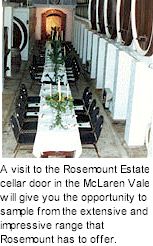


Much has changed over the years at Rosemount Estate however, the commitment to quality that defined the original vision for Rosemount Estate's humble beginnings in the Hunter Valley has remained intact. This vision has remained pivotal to the progress and success of the now world famous winery that is Rosemount Estate.

Bob Oatley established Rosemount Estate in 1969 after a career in the coffee industry where he was awarded the British Empire Medal for his services in Papua New Guinea. Bob Oatley instilled at Rosemount Estate a mentality learned in the coffee industry, that a quality product will always be sought out and appreciated. Bob Oatley's wish to establish a reputation for fine wine production was satisfied early and has led Rosemount Estate to establish a wide variety of vineyard sites around Australia that take advantage of the varied soil types and regional climates. In 1992 he was awarded the Graham Gregory Trophy for 'Significant contribution to the Wine Industry of New South Wales.'
The Rosemount Estate crest reflects the Upper Hunter Valley setting of the Rosemount Estate and the passions of the founding Oatley family. The horse silhouette on the top left denotes the many stud farms of the Upper Hunter Valley and the Oatley family's long association with thoroughbred horse racing. The adjacent rose represents the beautiful rose gardens that lead up to the cellar door at the Rosemount Estate Denman Vineyard. The bunch of grapes below signifies the long, and successful history of viticulture at Rosemount Estate.
"I believe that the Australian legacy to the world of wine is a focus on varietal flavour. At Rosemount Estate, I have taken this further to make wines that are renowned for their full flavour, yet easy-drinking nature. This is the hard option, so it's no surprise that it's also the most rewarding." - Ex-Rosemount Estate Winemaker, Andrew Koerner

As the grapes approach maturity, the winemaker works closely with vineyard managers across the estate, travelling the country to assess sugar levels and flavour levels in order to define the point of optimum ripeness. When the winemaking team believe the grapes are ready, the vintage can begin. On arrival at the winery, each load of grapes is appraised to ensure that quality standards are at their peak. The winemaker will then decide upon appropriate crushing, pressing and fermenting techniques to harness and optimise the potential of every batch.
State of the art winemaking equipment is available to the Rosemount Estate team, guaranteeing their ability to nurture each batch of wine to retain clear varietal and regional character. From rotary fermenters to computer monitored temperature control, Rosemount Estate Winemakers have the very best facilities at their disposal.
Winemaking technology does not, however, preclude traditional techniques such as natural yeast fermentation, barrel maturation and 'battonage' lees stirring, where appropriate. At the McLaren Vale winery in South Australia, for example, 100-year-old open vats are used to gain long-chain tannin extraction from fermenting must in the production of ultra-premium red wines.
As the young wines mature in barrel, they are regularly racked and topped. The Chief Winemaker has the final say on each of the finished blends, which are then carefully clarified prior to bottling. With so much at stake, it is little surprise that Rosemount Estate's quality standards extend to the very best in bottling line technology. This impressive facility is geared to ensuring that the wine flavours skilfully nurtured over long months by the winemakers are captured in each bottle for wine drinkers the world over to enjoy with every glass.
